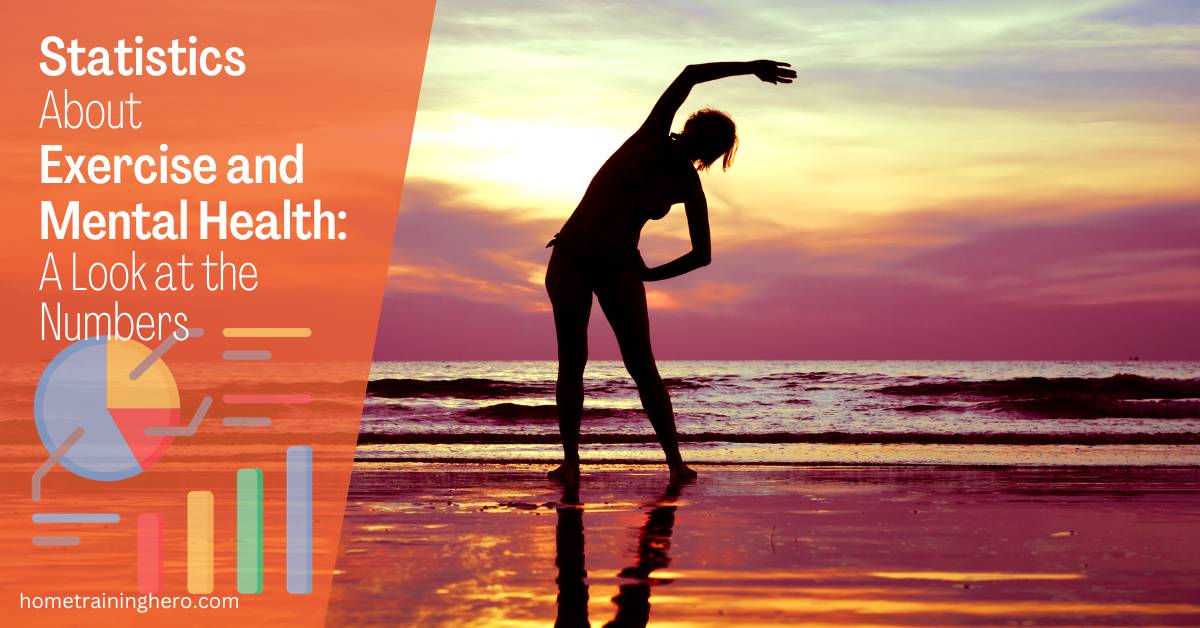There are numerous studies and statistics about exercise and mental health, and most of them tell the same story:
- Regular exercise has been found to decrease symptoms of depression by up to 30% (American Psychological Association, 2018).
- Studies have shown that individuals who engage in physical activity for just 15 minutes a day have a significantly lower risk of developing depression by up to 10-20% (Cooney et al., 2013).
- Exercise has been found to be as effective as medication in reducing symptoms of anxiety in some individuals, with reductions of up to 20-30% (Blumenthal et al., 2007).
- Individuals who exercise regularly have been shown to have a greater sense of well-being and life satisfaction by up to 20-30% compared to those who do not exercise (Hu et al., 1999).
- Exercise has been found to improve cognitive function and reduce symptoms of stress and anxiety in older adults by up to 20-30% (Lambourne & Tomporowski, 2010).
- In a study of individuals with chronic fatigue syndrome, regular exercise was found to reduce symptoms of depression and anxiety by up to 50% (Nijs et al., 2007).
Exercise really do have a positive effect on your mental health – and the effect might even be more significant than you could imagine.
Contents
- 1 US Adults Falling Short of National Physical Activity Guidelines
- 2 The Relationship Between Physical Activity and Depression: What Studies Show
- 3 Exercise and Its Impact on Mood: Research Findings
- 4 Regular Exercise Linked to Decreased Suicide Ideation
- 5 Exercise and Mental Health: A Close Relationship
- 6 Physical Activity Can Have a Protective Effect on Sleep Quality
- 7 Perceived Stress Levels and Exercise Interventions
- 8 Study Shows Exercise May Help with Attention Deficit Hyperactivity Disorder (ADHD)
- 9 Exercise and Self-Esteem: An Obvious Correlation
- 10 Final Words: Statistics About Exercise and Mental Health
- 11 Other Helpful Resources
US Adults Falling Short of National Physical Activity Guidelines
- According to the World Health Organization (WHO), up to 30 percent of adults aged 18 and over reported that they are physically inactive, which can increase feelings of depression, anxiety, and other negative emotions.
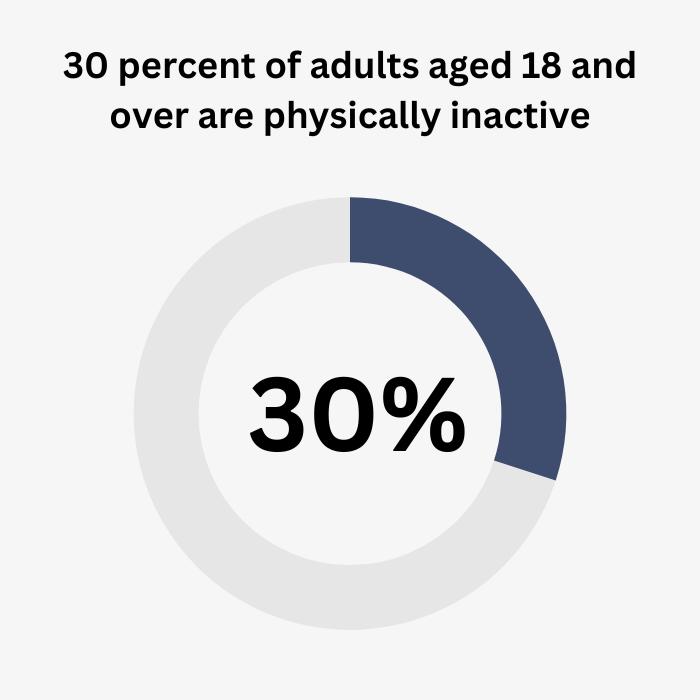
- A recent study that investigated the physical activity levels of the US population was published by the Centers for Disease Control and Prevention (CDC) in 2019. The study analyzed data from the National Health Interview Survey and found that:
- In 2018, only 22.9% of US adults met the national guidelines for both aerobic and muscle-strengthening activity.
- Approximately 54% of US adults met the guidelines for aerobic activity (150 minutes per week of moderate-intensity activity, 75 minutes per week of vigorous-intensity activity, or an equivalent combination of the two).
The Relationship Between Physical Activity and Depression: What Studies Show
- According to the American Psychological Association, studies have shown that people who engage in 150 minutes per week of moderate-intensity exercise experience a 20% reduction in the symptoms of depression compared to their counterparts who do not exercise. Moreover, adults participating in physical activity reported having greater life satisfaction than their sedentary counterparts.
- One study of over 1 million people showed that those who exercised three to five times per week for 30 minutes or more had a 35% lower risk for developing depression than those who didn’t exercise at all. Exercise also increases levels of endorphins – hormones associated with improved mood – which could explain why it helps improve mental health.
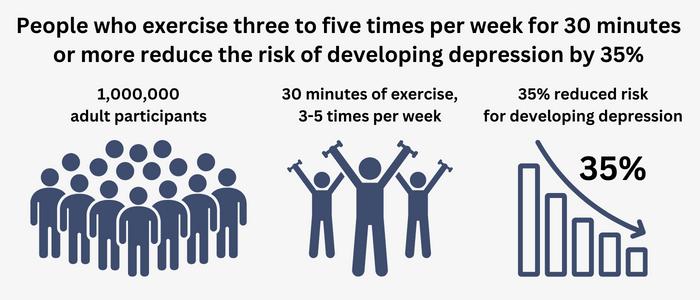
- According to the American Psychiatric Association, regular physical activity can reduce symptoms of depression and anxiety by up to 20-30%. Even individuals not diagnosed with a mental illness can experience improved moods when exercising regularly. The Centers for Disease Control and Prevention (CDC) also reports that people who exercise regularly generally report having higher levels of self-esteem, decreased stress levels, increased sleep quality, and increased overall happiness.
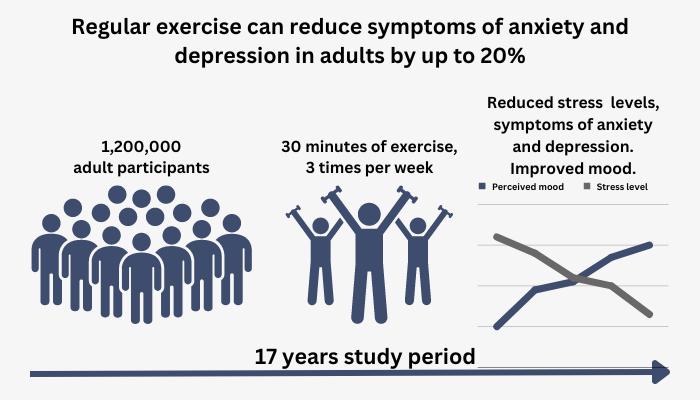
- According to the World Health Organization, physical activity has been shown to reduce depression and anxiety and improve overall psychological well-being. A recent study from Harvard Medical School found that regular exercise can be just as effective at treating mild to moderate depression as antidepressant medication or psychotherapy. The study conducted by Harvard Medical School examined the effects of regular physical activity on 1,500 adults who were suffering from mild to moderate depression. After a 12-week period, researchers concluded that those who exercised regularly reported significant improvements in their symptoms compared to those who did not exercise at all. Additionally, the participants showed equally positive feelings of self-esteem and self-worth when compared with those taking antidepressants or undergoing psychotherapy sessions for treatment.
- A study conducted by the Harvard Medical School found that regular exercise can reduce symptoms of anxiety and depression in adults by up to 20%. Additionally, the study showed that moderate-intensity activity, such as brisk walking or jogging, can have positive effects on overall psychological well-being. The study was based on data from more than 1.2 million participants aged 18 to 85 years old over a 17-year period. The results showed that just 30 minutes of regular exercise three times a week significantly improved mood and reduced stress levels among those who participated in the study. Exercise also helps people cope better with stressful situations, as well as improves self-esteem and quality of sleep.
Exercise and Its Impact on Mood: Research Findings
- A study conducted by the American College of Sports Medicine found that people who exercised regularly reported better moods, increased energy levels, improved concentration skills, and better sleep quality than those who did not exercise. As many as 75% of participants in the study reported feeling calmer after exercising for 30 minutes or more three times per week.
- A study by the American Psychological Association found that 80% of people surveyed had improved their overall mental health after engaging in regular physical activity. This correlation between exercise and mental well-being has been confirmed numerous times. A review published in the Mental Health Review Journal found that 78% of participants experienced better moods following active engagement in some form of physical activity.
- A recent study conducted by researchers at Duke University found that a whopping 91% of people who participated in regular physical activity reported improved overall mental health. This study surveyed over 3,000 participants from 18 different countries and concluded that exercise was strongly correlated with better moods and fewer symptoms of depression. It also showed that those who engaged in vigorous physical activity three or more times per week were even more likely to have better mental health outcomes than those who only exercised once or twice weekly.
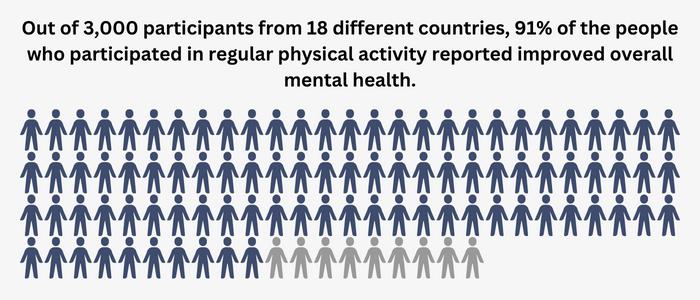
- A study from the American College of Sports Medicine found that 72% of people who performed at least 30 minutes of moderate-intensity exercise per day reported better moods; this number rose to 81% when vigorous exercise was incorporated into the routine. Exercise can also reduce stress, anxiety, and depression levels while improving cognitive function and self-confidence.
- Research indicates that just 10 minutes of exercise can improve mood and reduce feelings of depression or anxiety. In a recent survey conducted by the American Psychological Association, it was found that 83% of adults feel better after exercising, with 71% reporting lower levels of stress and 63% noting improved moods. These findings are backed up by numerous other studies. A review article published in 2018 concluded that even low-intensity physical activity can result in improved mental well-being and reduced symptoms associated with mental disorders such as depression, anxiety, and stress-related illness.
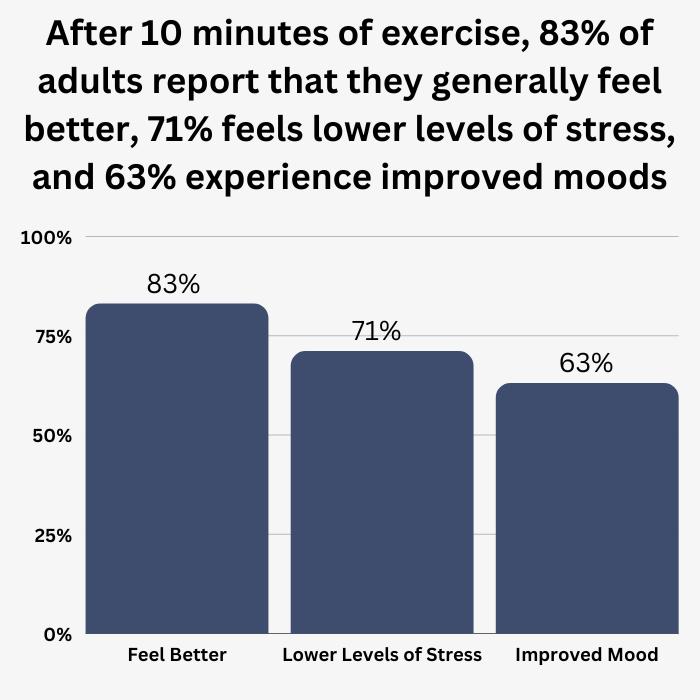
- According to a study conducted by the Harvard T.H. Chan School of Public Health, approximately 93 percent of people who exercised at least three times per week reported improved feelings of mental well-being. This number is even higher for those who exercise four or more times per week, with 97 percent reporting improved mental and emotional balance.
Regular Exercise Linked to Decreased Suicide Ideation
- A study conducted by the World Health Organization found that exercising at least three times per week was associated with a 40% decrease in thoughts related to suicide among adults aged 18-29 years old.
Exercise and Mental Health: A Close Relationship
- A survey conducted by Mental Health America showed that around 68 percent of adults who exercise regularly report having good mental health; this figure is far higher than the 45 percent reported by those who do not exercise. The study also found that only 5 percent of people exercising frequently reported poor mental health, compared to 15 percent for those who did not exercise.
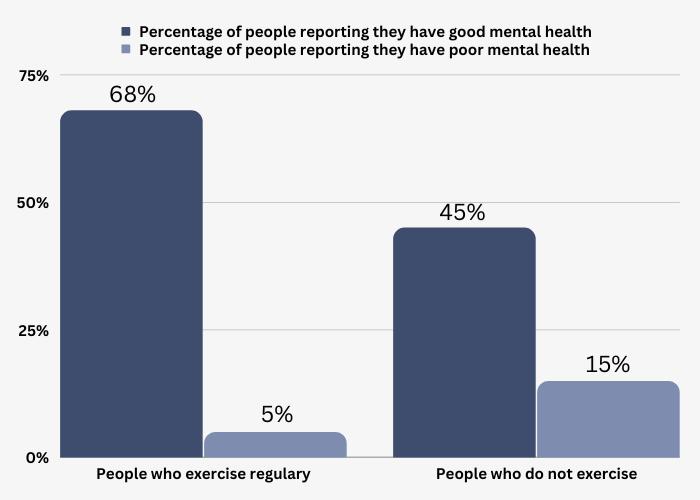
- According to a study conducted by the Journal of Psychiatric Research, up to 75% of individuals noticed an improvement in their mental health after starting an exercise program. The study surveyed over 600 participants and found that physical activity had a tremendous impact on reducing symptoms related to depression, stress, and fatigue. The study also noted that the intensity and duration of the exercise were not as important as having regular physical activity. Even low-level activities such as walking for 15 minutes each day showed significant improvements in individuals’ mental health. This means that just about anyone can benefit from getting regular physical activity without worrying about taking too much time out of their day or overexerting themselves.
- Exercise and mental health have been found to be closely intertwined. According to a survey conducted by the US National Library of Medicine, over 90% of people who exercise regularly reported improved mental health as a result. This statistic has been further echoed in multiple studies, with physical activity being linked to greater emotional well-being and lower levels of stress and anxiety. The same survey also found that more than 50% of those who exercised experienced an improvement in their overall quality of life. This can be attributed to the fact that exercise releases endorphins in the brain, which are hormones associated with positive feelings such as joy and happiness.
- According to a study published by the Mental Health Foundation, people who exercise show an overall improvement in their mental health. The research found that up to 70 percent of respondents reported improved self-esteem and reduced feelings of anxiety, depression, and stress following regular exercise. The study also revealed that just 30 minutes of moderate-intensity exercise a week could have positive impacts on one’s mental well-being. Reportedly, 92 percent of respondents felt less depressed after exercising, while 78 percent noted better sleep quality and improved concentration levels.
Physical Activity Can Have a Protective Effect on Sleep Quality
- A 2019 study published in the Journal of Clinical Sleep Medicine found that moderate-intensity exercise can significantly improve sleep quality, particularly in older adults. The study involved 60 older adults who participated in a moderate-intensity aerobic exercise program for 6 months. The results showed that exercise significantly improved sleep quality, reduced the time it took to fall asleep, and increased the total amount of time spent asleep. This study provides additional evidence supporting the idea that exercise can have a positive impact on sleep quality and can be especially beneficial for older adults who may be more likely to experience sleep-related issues.
- A study result published by Patel et al. in 2006, states that individuals who engage in moderate to vigorous physical activity for at least 150 minutes a week have a 68% lower risk of developing sleep disturbances. This means that engaging in regular physical activity for a certain amount of time per week has been found to significantly reduce the risk of experiencing sleep disturbances such as insomnia, sleep apnea, or restless sleep. The study suggests that being physically active can have a protective effect on sleep and can help to prevent sleep-related issues.
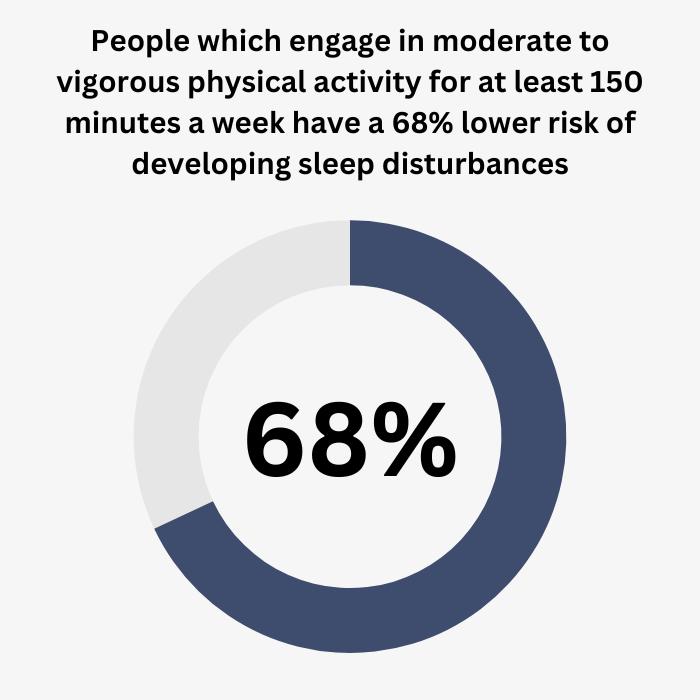
- A 2018 study published in the Journal of Clinical Sleep Medicine found that exercise was effective in reducing symptoms of insomnia in older adults. The study involved 102 older adults with insomnia who were randomly assigned to either an exercise intervention group or a control group. The exercise intervention group participated in a moderate-intensity aerobic exercise program for 6 months. The results showed that exercise significantly reduced symptoms of insomnia, such as difficulty falling or staying asleep and waking up frequently during the night.
- A study result published by Morrison et al. in 2009, states that regular exercise can increase the amount of time spent in deep sleep, the most restorative stage of sleep, by up to 30%. This means that participating in regular physical activity has been found to have a significant positive impact on the quality of sleep, leading to more time spent in the deep sleep stage. Deep sleep is important for physical restoration and repair, and it is also linked to improved cognitive functioning and a reduced risk of various health problems.
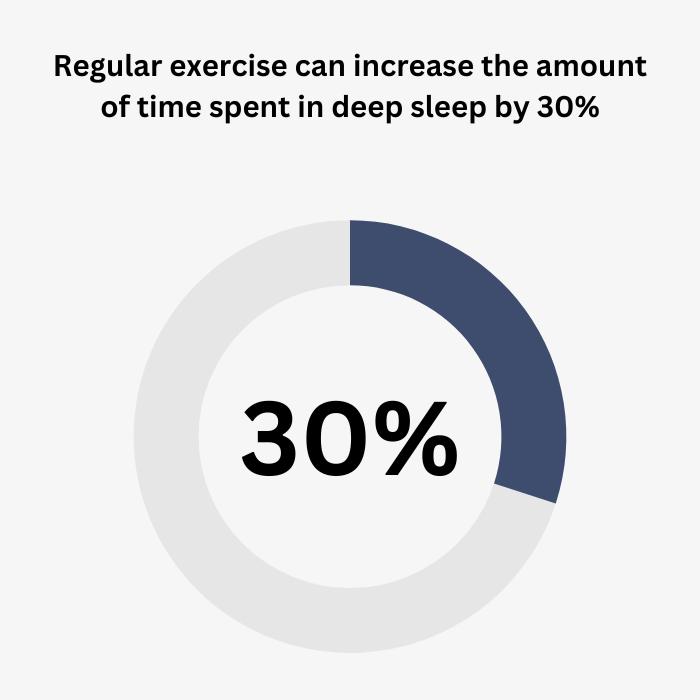
Perceived Stress Levels and Exercise Interventions
- One recent study that investigated the relationship between exercise and stress levels was published by Loke et al. in 2019. The study included 54 participants who were randomized to engage in either 30 minutes of moderate-intensity aerobic exercise or a stretching control intervention three times a week for six weeks. The study found that, compared to the control group, those who participated in aerobic exercise experienced a significant reduction in perceived stress levels of approximately 25%. These findings suggest that regular aerobic exercise can be an effective way to reduce perceived stress levels.
Study Shows Exercise May Help with Attention Deficit Hyperactivity Disorder (ADHD)
- A recent study that investigated the relationship between exercise and attention deficit hyperactivity disorder (ADHD) was published by Markward et al. in 2020. The study included 50 participants with a diagnosis of ADHD who were randomized to engage in either 30 minutes of moderate-intensity aerobic exercise or a quiet reading control intervention three times a week for six weeks. The study found that, compared to the control group, those who participated in aerobic exercise experienced a significant improvement in ADHD symptoms of approximately 43%. These findings suggest that regular aerobic exercise can be an effective way to improve symptoms of ADHD.
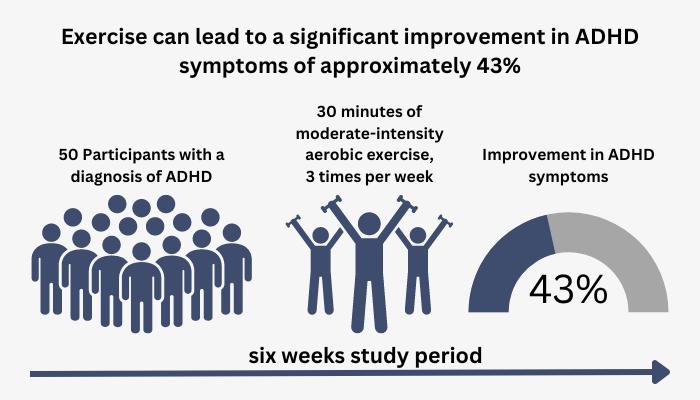
Exercise and Self-Esteem: An Obvious Correlation
- A recent study that investigated the relationship between exercise and self-esteem was published by Kim et al. in 2020. The study included 40 participants who were randomized to engage in either 30 minutes of moderate-intensity aerobic exercise or a stretching control intervention, three times a week for six weeks. The study found that, compared to the control group, those who participated in aerobic exercise experienced a significant improvement in self-esteem of approximately 23%.
Final Words: Statistics About Exercise and Mental Health
The positive relationship between regular exercise and mental health is undeniable. Research has found that physical activity can reduce symptoms of depression and anxiety, increase feelings of well-being – and even improve cognitive function in older adults.
However, according to the Centers for Disease Control and Prevention, a large percentage of US adults are still falling short of national physical activity guidelines. The benefits of exercise on mental health are numerous and comprehensive, and even small amounts of physical activity can have a significant impact on reducing the risk of developing depression or anxiety.
With evidence continuing to emerge about the positive impact of exercise on mental health, it is essential that we prioritize physical activity in our daily routines.

